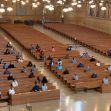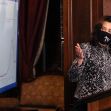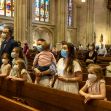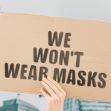In order to avoid large groups of people and help slow the spread of COVID-19, churches have been forced to close down and not offer in-person services. Many churches responded with live streams of their services as an alternative. With some states slowly reopening, some churches are now providing in-person services at a limited capacity, with pews marked off to help with social distancing. Advocates for closing churches say it is a way to prevent people from gathering in large groups and spreading COVID-19. Those against it say that it is an attack on religious freedom since other places like restaurants, grocery stores, and liquor stores can stay open because they are considered “essential.”
If the government only closed down churches during the COVID-19, such a move could be considered an outright attack on the First Amendment. By the same token, however, churches are not constitutionally entitled to exemptions from measures that can help with safety if they are applied to everyone evenly. As long as the government is applying COVID-19 restrictions evenly to both religious and secular places, the First Amendment is not implicated, according to Supreme Court precedent.
In Louisville, right before Easter, a local court decided that the city’s rules were “beyond all question” violating the Free Exercise Clause of the First Amendment. Louisville had banned church services, even drive-in style services where all people stayed in their cars. However, other drive-in and drive-through style secular places were allowed to stay open, such as drive-through liquor stores. Since this rule was applied to religious services and not similarly situated secular
services, the rule was applied unevenly and unfairly in violation of the constitution.
State and federal governments are allowed to restrict religious activities if there is a “compelling” government interest. An example of a government interest is public health, an area clearly impacted by the COVID-19 pandemic. Allowing people to be in large groups together for long periods like during religious services can carry the risk of infecting others. However, if secular activities are allowed to resume activities that carry the same risk while religious ones are not, like movie theaters or concerts, then that move would be discrimination against religious institutions. Such a disparity also would weaken the argument that the closure is a “compelling” government interest.
Most states do not have any major restrictions on worshiping in person. In 31 states, there are no statewide restrictions on in-person worship. Eleven states have restrictions that are similar to other activities. Nine states have restrictions that are a bit stricter.
One aspect of the restrictions and closures that bothered many people is that churches were not considered “essential” like grocery stores, restaurants, doctor’s offices, etc. Instead, they were considered “mass gatherings” like movie theaters, sporting events, and concerts. While all would agree that services such as grocery stores and doctor’s offices are essential, people were upset that places like liquor stores were also considered “essential” while churches were not. However, church services are different in important ways from grocery stores and liquor stores. According to Chief Justice Roberts, when it comes to large gatherings like sporting events and church services, “large groups of people gather in close proximity for extended periods of time.” In places like grocery stores, people are less likely to be in close proximity with each other than they are during church services and other large gatherings.
While restrictions on in-person church services as large gatherings may have been justified at the beginning of the pandemic, they may be harder to justify as restrictions are loosened in other areas of community life. As long as there are restrictions on church services due to the COVID-19 pandemic, there will be tensions as to whether they are appropriate, especially as cities, counties and states begin to reopen incrementally.






